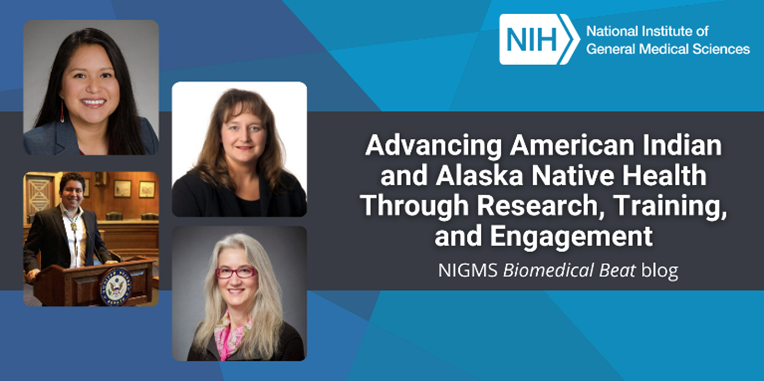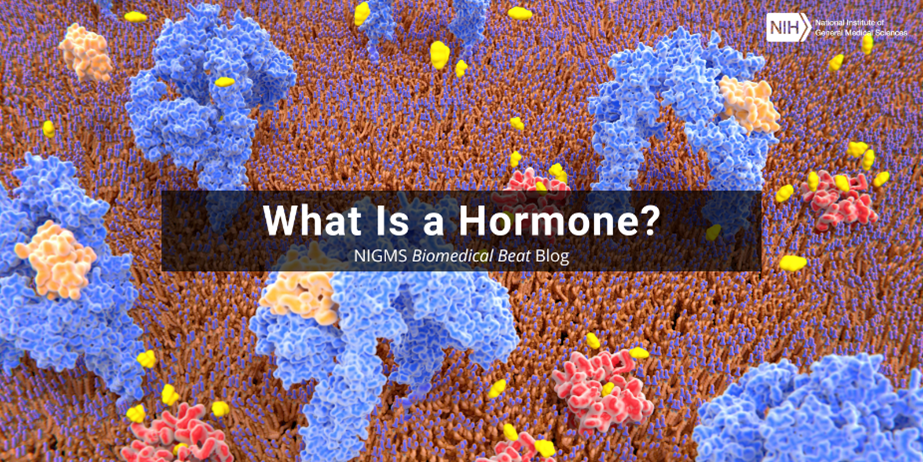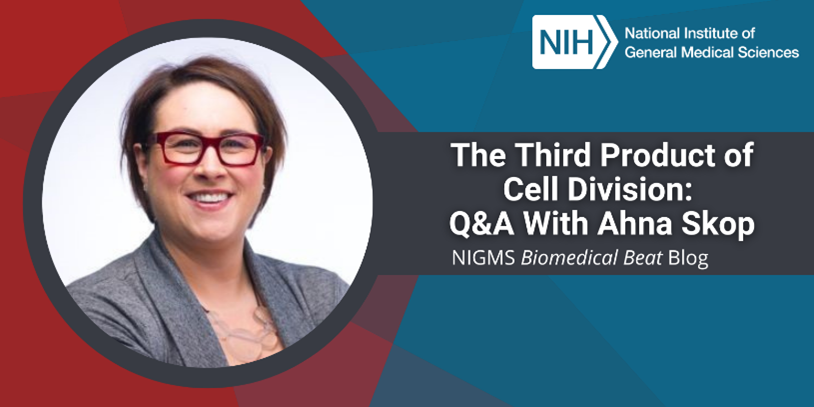American Indian and Alaska Native (AI/AN) populations have long experienced health disparities such as higher rates of diabetes, certain cancers, and mental health conditions than those of other Americans. One contributing factor in these disparities is underrepresentation of AI/AN populations in biomedical science—as study participants, researchers, and health professionals. Unfamiliarity with health care options and opportunities, coupled with a distrust of biomedical research resulting from unethical studies in the past, have exacerbated this underrepresentation.
NIGMS-supported researchers, including Native scientists, are partnering with AI/AN Tribes to help reduce health disparities by conducting research focused on AI/AN health priorities and building infrastructure that supports research in those communities. They’re also preparing Native students to pursue careers in science and medicine. In this post, you’ll meet four scientists advancing AI/AN health.
Growing Knowledge About Genomics
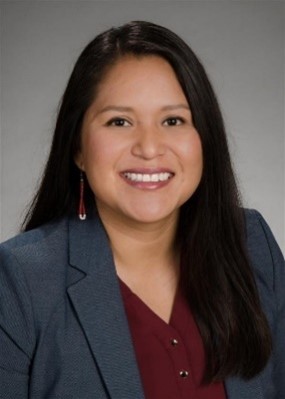
“A lot of people think there’s conflict between Indigenous worldviews and science, but I think there are ways to bring both into the research space,” says Katrina Claw, Ph.D., a Diné (Navajo) assistant professor of biomedical informatics at the University of Colorado School of Medicine in Anschutz. Dr. Claw partners with Tribes to study pharmacogenomics—how a person’s genetics can affect their response to medications—in AI/AN populations. Her lab also seeks to understand and share the ethical, cultural, and social implications of genomic research with Native communities.
In 2021, Dr. Claw began an NIGMS-supported project to increase genetics knowledge in the Navajo Nation. This work is the direct result of a survey she and colleagues conducted, asking Navajo Tribal members about their perspectives on genetic research. Most respondents didn’t know about the Navajo Nation’s current ban on genetic research and wanted to learn more about this type of research and its potential risks and benefits for their community. Dr. Claw is now working with fluent Navajo speakers to create a Navajo glossary of more than 200 genetics terms, with NIGMS funding through the Diné College Native American Research Center for Health (NARCH). She’s also overseeing the development of educational social media messages and short videos. Once all these materials are completed, she plans to host a public conference where the whole Navajo community can provide feedback.
Dr. Claw first formed research partnerships with Native communities as a postdoctoral fellow, including work with Yup’ik Alaska Native people on genetic variation in vitamin D metabolism that was funded by an NIGMS F32 fellowship. Now that she has her own lab, Dr. Claw hopes to support the next generation of scientists and show them how to collaborate with Tribes. “I want to be a resource for Indigenous students and people who want to work with communities in the right way,” she says.
Improving Native Health in Oklahoma
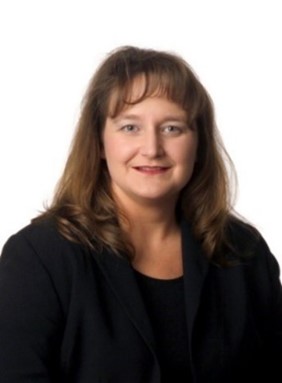
As a rheumatologist with Tribal heritage, Judith James, M.D., Ph.D., began wondering why her patients who were Tribal members tended to have more advanced diseases than those who weren’t. (Rheumatologists treat diseases—such as arthritis—that affect muscles, bones, and joints.) Working with the NIGMS-supported Cherokee Nation NARCH, Dr. James learned that many of the diagnostic blood tests for rheumatological conditions had never been studied in Native populations and therefore might not identify the diseases as well or as early as in other populations. Consequently, Dr. James conducted research to identify blood markers that predicted rheumatological diseases earlier in patients seen in Tribal health centers, enabling them to receive diagnoses and treatment sooner.
Dr. James has supported a broad range of other research collaborations with Native communities as the program director of the NIGMS-supported Oklahoma Shared Clinical and Translational Resources (OSCTR). Six Tribes and the Southern Plains Tribal Health Board, which includes representatives from all 39 Tribes in Oklahoma, have partnered with OSCTR. One initiative, Healthy Hearts for Oklahoma, helped reduce cases of heart attacks and high blood pressure in the state by working with more than 300 doctors—including many at Tribal hospitals and the Indian Health Service—to share simple preventive steps with patients. Other recent projects addressed cancer screening and the COVID-19 pandemic.
OSCTR has also helped multiple Tribes develop the infrastructure needed to conduct biomedical research. “They now have a stronger voice in clinical research and have implemented innovative programs to improve health in their populations,” says Dr. James.
Dr. James has personally mentored many Native undergraduates in her lab. Her mentees have often gone on to medical or graduate school, and one, Matlock Jeffries, M.D., a Cherokee citizen, is now an associate member in her department at the Oklahoma Medical Research Foundation and interim rheumatology chief at the University of Oklahoma.
Building Partnerships with Montana Tribes
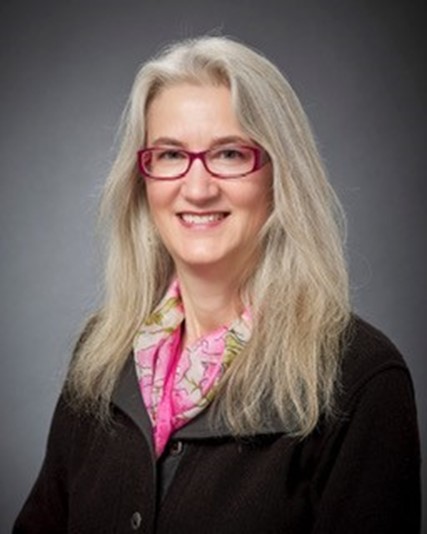
“Long-term partnership by an investigator or center with a community has a lot of ripple effects. Community members gain new tools and use them to solve problems and write their own grants. Native students get trained in science, return to their communities, and do impactful work there,” says Alexandra Adams, M.D.,
Ph.D., the director and principal investigator of the NIGMS-supported Center for American Indian and Rural Health Equity (CAIRHE) at Montana State University in Bozeman.
CAIRHE builds partnerships between Native American communities and researchers who have expertise in the communities’ areas of concern. Recent CAIRHE research includes a study on home-based COVID-19 testing and work on mitigating the health impacts of severe weather caused by climate change, such as living with extreme heat or inhaling wildfire smoke. “The issues we work on span a huge gamut because each community has its own needs,” says Dr. Adams.
To ensure that beneficial research partnerships continue, CAIRHE trains young scientists to collaborate with Native communities. For example, CAIRHE mentored and funded Monica Skewes, Ph.D. With its support, she began working with several Tribes on the Fort Peck Indian Reservation, investigating causes of and potential interventions for people’s return to substance misuse. Dr. Skewes worked with Tribal partners to tailor an intervention to their community and is now testing it through an NIH-funded clinical trial.
In addition to its work preparing individual investigators, CAIRHE is developing a health equity network made up of health care and community organizations to help conduct research with Native and rural communities.
Advocating for AI/AN Health
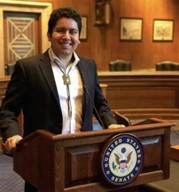
At a young age, Alec J. Calac was inspired to pursue medicine by his father, the first member of the Pauma Band of Luiseño Indians to become a physician. Alec is now a fifth-year M.D.-Ph.D. student in the NIGMS-supported Medical Scientist Training Program at the University of California, San Diego (UCSD), School of Medicine and the Herbert Wertheim School of Public Health and Human Longevity Science and a well-known advocate for Native communities and students. “I’m always thinking about how my work can help my community, and vice versa,” says Alec.
As a NARCH-supported undergraduate at the University of Arizona in Tucson, Alec was a chapter president for the Society for the Advancement of Chicanos/Hispanics and Native Americans in Science. During a 2-year NIH fellowship after his graduation, he regularly addressed the organization’s Tribal Advisory Committee about the importance of STEM education pathways for AI/AN students. Alec also worked with the National Indian Health Board during that timeframe, representing his home state of California regarding issues the Native communities faced.
As an M.D.-Ph.D. graduate student, Alec helped establish the UCSD’s Program in Medical Education – Transforming Indigenous Doctor Education, which prepares medical students to meet the health care needs of AI/AN communities. He is also the national president of the Association of Native American Medical Students and chair of the American Medical Association Medical Student Section Committee on American Indian Affairs. In early 2022, the White House Office of Public Engagement invited Alec to participate in the Health Equity Leaders Roundtable Series, which aims to help shape current and future health equity policy.
“It’s very exciting to be part of effecting change as a trainee. I think many trainees feel like it’s not their time, but if not now, when?” Alec says. After he graduates and completes his medical residency, he hopes to work at an academic medical center and lead a workforce development program for Native medical students. He thinks he’ll move into a health policy role later in his career. “What keeps me going is that there’s no shortage of things to do when it comes to Native health. We have centuries-long health disparities to close,” says Alec.
Dr. Claw’s work with the Navajo Nation is funded by NIGMS grant S06GM142121 sub project 8330; her pharmacogenomics work is supported by grant R35HG011319 from the National Human Genome Research Institute. Dr. James’ research with the Cherokee Nation is funded by NIGMS grant S06GM127983 sub project 6284; her total NIH support includes grants from the National Institute of Allergy and Infectious Disease and the National Institute of Arthritis and Musculoskeletal and Skin Diseases. OSCTR is supported through the Institutional Development Award Networks for Clinical and Translational Research program by NIGMS grant U54GM104938. CAIRHE is supported by NIGMS grant P20GM104417. The Medical Scientist Training Program at the UCSD School of Medicine is funded by NIGMS grant T32GM007198.


